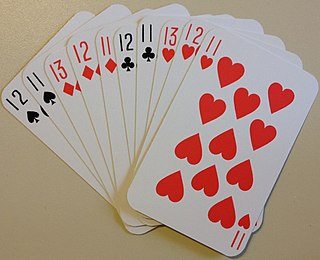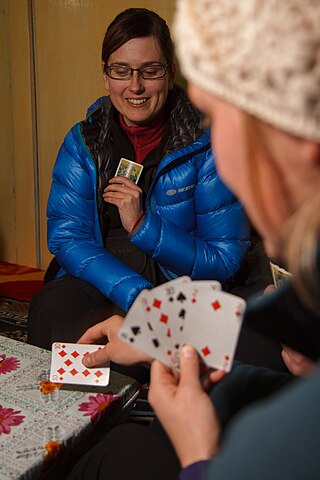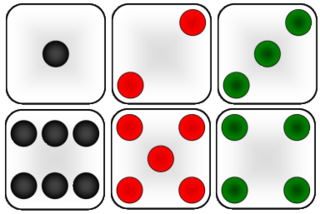Pai gow poker is a version of pai gow that is played with playing cards, instead of traditional pai gow's Chinese dominoes. The game of pai gow poker was created in 1985 in the United States by Sam Torosian, owner of the Bell Card Club.

Sheepshead is an American trick-taking card game derived from Bavaria's national card game, Schafkopf. Sheepshead is most commonly played by five players, but variants exist to allow for two to eight players. There are also many other variants to the game rules, and many slang terms used with the game.

Whist is a classic English trick-taking card game which was widely played in the 18th and 19th centuries. Although the rules are simple, there is scope for strategic play.

500 or Five Hundred is a trick-taking game developed in the United States from Euchre. Euchre was extended to a 10 card game with bidding and a Misere contract similar to Russian Preference, producing a good cut-throat three player game like Preference and a four player game played in partnerships like Whist which is the most popular modern form, although with special packs it can be played by up to six players. It arose in America before 1900 and was promoted by the US Playing Card Company, who copyrighted and marketed a deck with a set of rules in 1904. In 1906 the US Playing Card Company released the improved Avondale scoring table to remove bidding irregularities. 500 is a social card game and was highly popular in the United States until around 1920 when first auction bridge and then contract bridge drove it from favour. It continues to be popular in Ohio and Pennsylvania, where it has been taught through six generations community-wide, and in other countries: Australia, New Zealand, Canada and Shetland. Despite its American origin, 500 is the national card game of Australia.

President is a shedding card game for three or more, in which the players race to get rid of all of the cards in their hands in order to become "president" in the following round. It is a Westernized version of Chinese climbing card games such as Zheng Shangyou, and the Japanese Daifugō.

Spades is a trick-taking card game devised in the United States in the 1930s. It can be played as either a partnership or solo/"cutthroat" game. The object is to take the number of tricks that were bid before play of the hand began. Spades is a descendant of the Whist family of card games, which also includes Bridge, Hearts, and Oh Hell. Its major difference as compared to other Whist variants is that, instead of trump being decided by the highest bidder or at random, the Spade suit always trumps, hence the name.

Yahtzee is a dice game made by Milton Bradley. It was first marketed under the name of Yahtzee by game entrepreneur Edwin S. Lowe in 1956. The game is a development of earlier dice games such as Poker Dice, Yacht and Generala. It is also similar to Yatzy, which is popular in Scandinavia.
Liar's dice is a class of dice games for two or more players requiring the ability to deceive and to detect an opponent's deception. In "single hand" liar's dice games, each player has a set of dice, all players roll once, and the bids relate to the dice each player can see plus all the concealed dice. In "common hand" games, there is one set of dice which is passed from player to player. The bids relate to the dice as they are in front of the bidder after selected dice have been re-rolled. Originating during the 15th century, the game subsequently spread to Latin American and European countries. In 1993, a variant, Call My Bluff, won the Spiel des Jahres.

Beer die, beer dye or snappa is a table-based drinking game where opposing players sit or stand at opposite ends and throw a die over a certain height with the goal of either landing the die in their opponent's cup or having the die hit the table and bounce over the scoring area to the floor. The defending team attempts to catch the die one-handed after it hits the table, but before it touches a non-table surface. The game typically consists of two two-player teams with each of the four players having a designated cup on the table, but can also be played one-vs-one.

Cee-lo is a gambling game played with three six-sided dice. There is not one standard set of rules, but there are some constants that hold true to all sets of rules. The name comes from the Chinese Sì-Wŭ-Liù (四五六), meaning "four-five-six". In America it is also called "See-Low," "Four-Five-Six," "The Three Dice Game," "Roll-off!," and by several alternative spellings, as well as simply "Dice." In China it is also called "Sān Liù Bàozi" (三六豹子), or "Three-Six Leopards". In Japan, it is known as "Chinchiro" (チンチロ) or "Chinchirorin" (チンチロリン).

Dudo, also known as Cacho, Pico, Perudo, Liar's Dice, Cachito or Dadinho is a popular dice game played in South America. It is a more specific version of a family of games collectively called Liar's Dice, which has many forms and variants. This game can be played by two or more players and consists of guessing how many dice, placed under cups, there are on the table showing a certain number. The player who loses a round loses one of their dice. The last player to still have dice is the winner.

Mus is a card game widely played in Spain, France and Hispanic America. Originated in the Basque Country, it is a vying game. The first reference to this game goes back to 1745, when Manuel Larramendi, philologist and Jesuit Basque, quoted it the trilingual dictionary (Basque-Spanish-Latin).

A pub game is one which is traditionally played inside or outside a pub or bar. Most pub games date back many years and are rooted in village culture. Many derive from older outdoor sports.
Mexico is an elimination-style dice game, in which several players agree to play a set number of rounds. After each round, one player is eliminated. When all players but one have been eliminated, the remaining player wins the game. Owing to its extremely simple play-structure, it is generally pursued as a method of gambling, whereby the final remaining player wins the amount of money wagered by each person who was eliminated in earlier rounds. A variant of the drinking game liar's dice known as Mexican or Mia uses similar dice rolls, but has very different game mechanics.

Kismet is a commercial dice game introduced in 1964. The game's name is the Turkish word for "fate". E. William DeLaittre holds the trademark on the game, which was originally published by Lakeside Games, and which is currently produced by Endless Games. Marketed as "The Modern Game of Yacht", the game play is similar to Yacht and Yahtzee, with a few variations. A primary distinction is that in Kismet, the sides of the dice have different colored pips.
Yaniv, also known as Jhyap, Jafar or aa’niv, is a Nepalese card game popular in Israel. It is a draw and discard game in which players discard before drawing a new card and attempt to have the lowest value of cards in hand. The game is considered a backpackers game in Israel, and it's popular among soldiers and young adults returning from long backpacking trips.

Ship, Captain, and Crew is a drinking game played with five dice. The game can be played with as few as two people, but is usually played in a group of five or more. The object of the game is to roll a six, a five ("captain"), and a four ("crew") with three dice, and get the highest score with the other two dice. In other versions, a four is the "mate" and the remaining dice are the crew.

Yacht is a public domain dice game, similar to the Latin American game Generala, the English game of Poker Dice, the Scandinavian Yatzy, and Cheerio. Yacht dates back to at least 1938, and is a contemporary of the similar three-dice game Crag. Yahtzee is a later development, similar to Yacht in both name and content.
The Genius: Rule Breaker is the second season of The Genius, which debuted on tvN on December 7, 2013.















